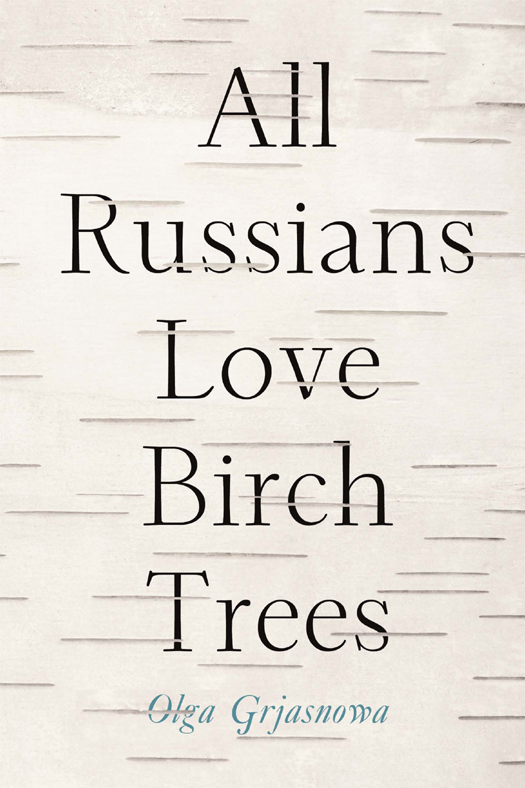
All Russians Love Birch Trees
A Novel
کتاب های مرتبط
- اطلاعات
- نقد و بررسی
- دیدگاه کاربران
نقد و بررسی

September 23, 2013
The narrator of Grjasnowa’s debut novel, Masha Kogan, speaks multiple languages but she doesn’t feel at home anywhere. Not in Germany, where her Russian-Jewish family immigrated to while fleeing war in Azerbaijan in 1987. German policy may be to build up its tiny Jewish community, but in practice immigrants of all kinds (especially Masha’s friends from Muslim backgrounds) are viewed with distrust. Not in Israel, where she moves after getting a job there as a translator and is suspect—as a Jew who speaks Arabic but not Hebrew. Her computer, which has Arabic stickers on it, is destroyed by guards at the airport because it is viewed as a security risk. Masha discovers Israel to be a jangled, violent place whose residents are either in denial about the violence around them or have trauma-induced stress disorders. Grjasnowa, who was longlisted for the 2012 German Book Prize, reveals herself to be an expert chronicler of modern displacement and of the scars left by the wars that followed the Soviet Union’s breakup—wars that most in the West managed to overlook or forget. She’s less able, though, to make us care about Masha, who, for all her grieving, flirting, and arguing, is less interesting than her circumstances.

October 1, 2013
A young Azerbaijan-born Jew tries to escape those ethnic and racial modifiers, with limited success, in Grjasnowa's flinty debut. Masha, the narrator of this trim but forceful novel, was born in Baku and has vivid memories of the violent ethnic strife among Azeris, Armenians and Russians there in the early 1990s. As the novel opens, she's a young woman living in Frankfurt with Elias, a German Christian, and working as a translator (she's fluent in five languages). But when Elias dies from an infected leg injury, Masha is cast adrift. She reconnects with Muslim friends and decides to take a job in Tel Aviv, which exposes her to the entrenched Jewish and Palestinian factions there. "I didn't want a genocide to be the key to my personality," she says, but past injustice is a raw wound wherever she goes, with whomever she meets. After falling for a relatively carefree Israeli, Ori, she's increasingly attracted to his sister, Tal, who's a more vociferous activist on behalf of Palestinians; the two become symbols of the opposite poles that Masha strives to avoid. Grjasnowa has endowed Masha with a caustic sense of humor that doesn't shortchange the grief she's suffered as a child or after Elias' death, and her frustration with being boxed in by identity politics is palpable. Grjasnowa is also skilled (via Bacon's translation) at describing Israel's monuments, landscapes, checkpoints and bars in clear, simple strokes. The novel's chief flaw is that the people in Masha's orbit are sometimes underdrawn--we hardly know Elias' character, or Masha's depth of feeling for him, before he's cut down. Even so, the novel closes on a note that reveals the fullness of her childhood anguish, bringing the story to a downbeat but effective end. A thoughtful, melancholy study of loss.
COPYRIGHT(2013) Kirkus Reviews, ALL RIGHTS RESERVED.

September 15, 2013
We know about the immigrant experience from an American perspective, but Grjasnowa gives us a fresh, important understanding from the European perspective, showing how Christians, Muslims, and Jews, those ethnically German and those not, don't quite manage coexistence in contemporary Germany. Azerbaijan-born Grjasnowa was 12 when she moved there, so she speaks with authority, as does her heroine, Masha Kogan, who's fluent in five languages and works as an interpreter. Masha is from an ethnically Russian family that fled Azerbaijan for Frankfurt, and she's Jewish despite her given name (Masha being a diminutive of Maria). Among her closest friends are cointerpreter Cem, Frankfurt-born but of Turkish origin, and first lover Sami, originally from Beirut but now a German citizen. As Masha says, almost without irony, they're "perfectly integrated model foreigners." Then her life is upended by the death of her boyfriend, Elias, and as she copes with her grief, desperate not to forget, she rediscovers German disdain. Still, she's not at home in Israel when there on assignment; for her, true home seems to reside in her nexus of friends. VERDICT Grjasnowa tells her story effectively because she works through the personal, which results in a touching and thought-provoking debut novel that's already won awards.--Barbara Hoffert, Library Journal
Copyright 2013 Library Journal, LLC Used with permission.

























دیدگاه کاربران